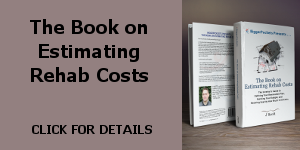As promised, I’m going to devote a couple posts to the financial aspects of owning single family houses…
The first question you should be asking if you’re planning on getting into the business of owning rental houses is, “How do I make money?” While the answer may seem straightforward, there is actually a good bit of disagreement among rental owners over the best way to profit from owning houses. There are two camps of thought here:
Cash Flow
Many rental property owners expect to make money off their properties every month. They collect rent, they use a portion of the rent to pay expenses, and voila, there’s still money left over as profit. This profit is known as cash flow, and while the cash flow on a single house may not be much more than $100-200 per month, if you own many houses, that income can add up to significant paycheck at the end of the year. Imagine owning 20 houses that each cash flow $100/month; each year, you would earn $24,000 from your rentals, and because of the tax breaks the real estate can often provide, you’d likely keep most of it.
Also, cash flow tends to increase the longer you own your property. In most parts of the country, rental rates will increase at a faster pace than expenses, allowing property owners to make more money with each passing year. Not to mention that, as property owners acquire more and more property, average expenses tend to decrease. If you own a single house, you may end up paying $30/month in lawn care costs; but if you own 20 houses, you can likely negotiate a discount with the lawn care guy to so all 20 houses; if you can get a $5 discount on lawn care for each house, that’s an extra $100/month in your pocket. This is known as economies of scale — the more you own, the less it costs.
Lastly, the panacea of many property owners is the day that their properties are paid off. Perhaps it’s 10, 15, or even 30 years down the road, but at some point, your renters will pay off your mortgage, and all that money that you were paying to the bank each month will now go in your pocket. Suppose you buy 10 houses when you’re 30 years old, each with a $600/month mortgage. If you keep a 30-year mortgage on each of them, when you’re 60, they’ll all be paid off. That’s $6,000 per month extra directly into your pocket — $72,000 per year!
Of course, the downside to investing strictly for cash flow is that you may be working pretty hard to find, acquire and manage each of those houses that is only paying you $100/month. Perhaps you don’t have the time or energy to manage such a big investment for such a small short-term profit? And if you don’t seriously manage your property investments, you run the risk of having those properties creep into disorder, at which point you’ll find it difficult to rent, keep renters and/or keep the rental prices up; when that happens, cash flow investors can find themselves losing money each month. And the more properties you have, the more money you’d be losing.
Appreciation
Of course, there’s more than one way to make money in real estate. Many investors bank on the fact that real estate values tend to move upwards over time, and during some periods of time they move upwards very quickly. For example, during the recent real estate boom, many property owners were seeing the value of their property increase 5% or more each month during some years. That means a house purchased for $100,000 one year could easily be worth $200,000 the next!
Using that reasoning, many investors decided that buying property that didn’t provide cash flow (or even lost money each month) could still be profitable. For example, buying a $500,000 house in California might have cost the owner over $2000/month (since the rental income couldn’t even come close to paying the monthly mortgage), but if that same house was worth $600,000 the following year, the owner could still make a lot of money. In fact, many investors go rich off the recent real estate boom because they bought strictly for the appreciation; as property values increased, so did their net worth.
Of course, the downside to investing strictly in anticipation of appreciation, is that sometime property values don’t increase very rapidly, don’t increase at all, or even decrease. When this happens, investors to stuck with a property that is costing them money every year, and that they can’t sell without breaking even or losing money.
So What’s the Answer?
The cash flow vs appreciation debate is an old one, but one that has gotten a lot more heated in recent years as the value of real estate has skyrocketed in many parts of the country. Many years ago, the cash flow folks could argue that appreciation wasn’t significant enough — and not likely enough — to justify purchasing negative cash flow properties. But, in recent years, there have been many parts of the country where a rental owner could be losing several hundred dollars a month in cash flow (that would have to come out of his pocket), but ultimately make tens — or even hundreds — of thousands of dollars in profit because of the significant appreciation in the property’s value. Of course, these days are seemingly coming to a close, but a lot of investors still bank on appreciation to the point where they will willingly own property that doesn’t make a significant cash flow, or in some cases, still loses money each month.
Of course, many would say, “Why not go after both cash flow and massive appreciation?!?!” And while that’s a reasonable goal, unfortunately it’s not an easy thing to do. The fact is, in many parts of the country where appreciation is highest, it’s very hard to find rental property that will provide positive cash flow. Using the example from above, in places where it is difficult to find a house for less than $500,000 (which would require nearly $2500/month in mortgage payments), it’s almost impossible to rent for enough money to cover your costs.
Personally, I believe that appreciation will ultimately contribute more to your net worth than will cash flow. But, I believe that this appreciation can’t be accurately predicted, and therefore shouldn’t be banked on. Sometimes appreciation on a large scale can take 10, 20, or even 30 years; to risk losing money each month for that period of time is not only a bad business decision, but can also put you into bankruptcy before you achieve your goal.
So, my personal opinion on this topic is: Invest for cash flow, and when one day down the road you make a lot of money on appreciation, smile and act surprised…
[googmonify]9523523149:center:468:60[/googmonify]




I just discovered you blog and I’m reading the whole thing starting from the beginning. I am starting a real estate investment company and your site has a wealth of information. This post really hits home for me. My entire strategy is based on buy-and-hold. My feeling is that if I go through all the work of finding a property that will provide positive cash flow every month, then why on earth would I sell it? This goes back to your rich vs wealth post. I could certainly make a lot of short-term cash rehab-flipping, wholesaling, or even speculating, but I would rather have a smaller amount per month that I know will be there even if I’m laying on the beach rubbing cocoa butter on my belly.
Thanks for sharing all this great information online. You’ve inspired me to do the same as I develop my own company.
Good luck in the coming year.
Josh Gesler
Here’s the problem with appreciation. With the exception of post-WWII and the past 10 years, housing has appreciated at just under the inflation rate for the past 100+ years. So you’re not going to actually make any money from the appreciation of a house.